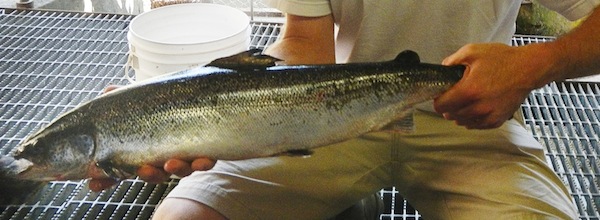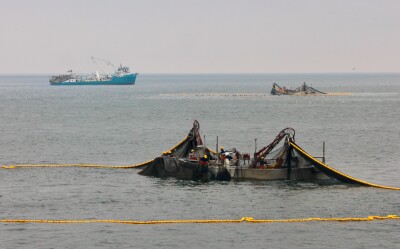Farmed salmon advocates say the aquaculture industry is making strides toward offering a more sustainable and ecofriendly product. But an Atlantic Salmon Federation news release announcing that farmed fish have escaped from Bay of Fundy sea cages suggests there's still room for improvement.
A Sept. 24 Washington Post article touting industry improvements acknowledges the problems that faced salmon farm operations a decade ago: the pollution of the oceans, the spreading of sea lice and disease, the depletion of forage fish stocks to provide feed for farmed fish and, yes, salmon escapement into the wild.
However since then, the article states, the industry has worked with the World Wildlife Fund, which along with the Dutch Sustainable Trade Initiative founded the Aquaculture Stewardship Council, to develop detailed responsible shellfish and finfish aquaculture practices. The article notes that the Monterey Bay Aquarium's Seafood Watch program has seen improvements the industry has made in all those problem areas.
But the Atlantic Salmon Federation issued a news release on Oct. 10 that indicates escapement remains a problem.
The release states that the organization's biologists are concerned about a large number of farmed salmon found in a fish trap in New Brunswick's Magaguadavic River. That's one of the Magaguadavic escapees pictured in the ASF Research photo seen below.
Their appearance, the conservation group says, indicates a large escape from sea cages in the Bay of Fundy that the aquaculture industry hasn't reported.
"This is a serious issue," states Jonathan Carr, ASF's director of research and environment, in the release, "as it is mandatory in New Brunswick for industry to report escapes of 100 salmon or more."
Carr has counted a total of 71 farmed salmon in the Magaguadavic fish trap this season, ASF says, making it the largest number of escapes encountered at the Magaguadavic, where the federation has had a monitoring station since 2001. Moreover, additional escapees have been seen at a fish ladder below the fish trap, the organization says.
The news comes on the heels of an escapement of between 20,000 and 50,000 mature farmed salmon from a cage site on Newfoundland's south coast; ASF says the escape was reported to Canada's Department of Fisheries and Oceans, which has implemented a recapture plan. The federation calls for greater containment of farmed salmon to prevent them from interbreeding with wild salmon, as well as better monitoring of escapements and stepping up enforcement of existing provincial and federal regulations.
If the farmed salmon industry is working to clean up its act and becoming a more sustainable endeavor, great. I prefer my salmon wild, but there's room for wild and farmed varieties in the marketplace. Different strokes for different folks (and taste buds).
But the escapement issue is troubling and must be resolved. ASF says that when wild and farmed salmon interbreed, the offspring are less fit to survive and to produce healthy offspring of their own. Farmed salmon production can't come at the expense of the health of wild salmon stocks.







